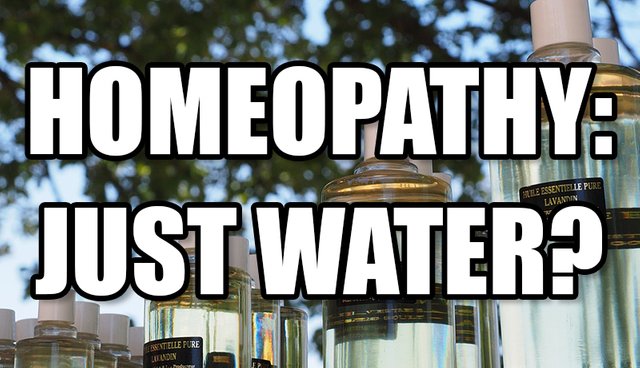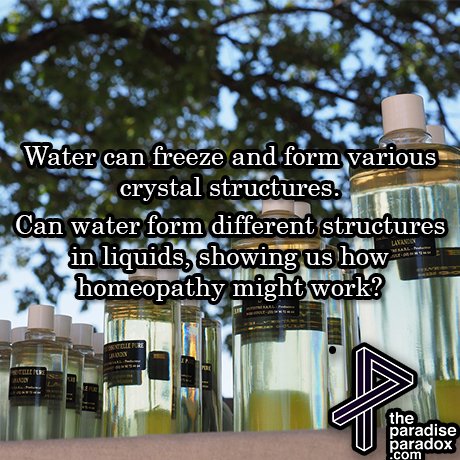Homeopathy: Just water?

Firstly, I should mention here that my goal with this essay isn't to make the case that homeopathy works. My experience with homeopathy has been positive, but too limited to even convince myself that it works, so I'd hardly expect to persuade anyone else. My intention is to present the much humbler case - that it's not clear that homeopathy is false; and that the most commonly-accepted argument against homeopathy is indeed false, based on phony logic and mistaken premises.
You'll know the argument if you've taken any interest in the subject. It goes like this: "They dilute it so much. It's just water. It can't work."
To phrase the argument more formally, it goes like this:
- Homeopathy involves extremely high dilutions, less than a part per million in some cases.
- Such a dilution is so high, it is pure water.
- A molecule of water in this solution is identical to a molecule in a regular glass of water.
- Therefore, this solution has identical properties to a regular glass of water.
- Therefore, the medicinal effect must be identical to regular water (or a placebo).
If you made it through Logic 101, right away you can see there's a problem here. The assumption is that, because the water molecules are identical in a vial of pure water and a vial of homeopathic solution, the water must have exactly the same properties. However, groups of things sometimes have different properties to individual things. The mistake is a fallacy of composition.
A classic example of a fallacy of composition is to say, both sodium and chlorine are fatal to humans, so when combined they must also be fatal. Therefore sodium chloride (table salt) must also be fatal to humans. But, it's not. The combination of sodium and chlorine in a compound has different properties.
Looking at how chemicals are structured, starting at the subatomic level, we can see how big this error might be. The same kind of neutrons, electrons and protons can be formed into atoms, having much different properties to the original particles. The same kinds of atoms can be arranged into different molecules, with much different properties again. Molecules can even be arranged in solids to form different crystal structures, or to lack crystal structure, with different melting points. So why would it be so strange to suggest that molecules might form different structures in liquids?

In fact, that's exactly what Nobel Laureate Luc Montagnier suggests as a hypothesis to explain his unusual experiments in which water can be coaxed to emit electromagnetic information about a DNA sequence, even when the DNA isn't present in the water. He calls these water structures “naneons”.
Other experiments also show that water isn't “just water”, such as the work of Louis Rey, showing that water can emit light signatures specific to the solution, even once the salts are in an ultra-high or homeopathic dilution, and a study from The Pennsylvania State University, which indicates that homeopathic solutions can be distinguished using stereoscopy, detecting very small bubbles apparently caused by the agitation of the medicine.
Finally, people like to say that there are no peer-reviewed studies that show a positive result. In reality, there are scores of studies that can be uncovered with a simple Google search. Here are a handful of these studies:
- A controlled evaluation of a homoeopathic preparation in the treatment of influenza-like syndromes.
- Oscillococcinum in patients with influenza-like syndromes: A placebo-controlled double-blind evaluation
- Effects of Homeopathic Medicines on Polysomnographic Sleep of Young Adults with Histories of Coffee-Related Insomnia
- Chronic primary insomnia: efficacy of homeopathic simillimum.
- Is evidence for homoeopathy reproducible?
So, does this mean that homeopathy works? I don't know. But I do know that reality is too complex and too subtle, and too fascinating, to allow our discovery to be halted by a reductive phrase such as: “It's just water”. We should not be guided solely by our preconceptions, as it is only through the challenging of our previous ideas that we can truly gain knowledge, and wisdom.
About me

My name is Kurt Robinson. I grew up in Australia, but now I live in Guadalajara, Jalisco. I write interesting things about voluntaryism, futurism, science fiction, travelling Latin America, and psychedelics. Remember to press follow so you can stay up to date with all the cool shit I post, and follow our podcast where we talk about crazy ideas for open-minded people, here: @paradise-paradox, like The Paradise Paradox on Facebook here, and subscribe to The Paradise Paradox on YouTube, and on iTunes
While I am skeptical of homeopathy, I appreciate the subtly of your argument. I do wonder though, at what point is there enough evidence that homeopathy is ineffective? Is your claim falsifiable and under what conditions?
I enjoyed your post and included it in today’s #philosophy-review
https://steemit.com/philosophy/@aaanderson/the-philosophy-review-12-4-2016
Let's see. I guess there are two main claims that I'm making here. The first is that the argument that "it's just water and therefore doesn't do anything more than tap water" is based on a fallacy of composition. That argument is never going to be logical, so anyone arguing against the benefits of homeopathy should take that into account, if they want to argue logically.
@baerdric has pointed out some valid criticisms of one of the papers I mentioned, such as self-reporting, and they're definitely not unique to that paper. What I have noticed in some of the studies, even ones which show a positive effect, is that they tend to be applying exactly the same remedy to many patients. Generally that's not what homeopaths do - they provide individualised treatment after asking many questions, taking an interest in the patient. What I'd propose would be a study where you have at least three groups:
In a broader sense, we already know that homeopathy "works" - that people receive some benefit from it. If they didn't, they wouldn't be spending so much money on it worldwide. Anybody claiming that "homeopathy doesn't work, case closed, no more questions to ask" really has a low/confused view of humans, a lack of understanding of economics, or a lack of curiosity necessary for scientific enquiry.
Part of the question is: is this benefit because of the medicine, or because of the way homeopaths talk to people compared to GPs, or some other part of the homeopathic process? Without including the third group, we can say whether the medicine is effective, but we can't say whether homeopathy is effective - which is obviously the more important question. If homeopaths talk to people in a way that helps them to heal, then those techniques could later be taught to GPs.
Of course, such a study would be rather impractical, because it would have to be a study which was not specific to a disease, as the diagnoses of the homeopaths could vary from one another, and from the GPs, and from any pre-screening for illnesses. In that case, it makes it very difficult to maintain objective measures of health, except in a very large and well-funded study.
Edit: On second thought, it might not be so impractical. Here's a relevant quote:
The other thing is, if it turns out that homeopaths do make people feel better without actually providing any health benefit, that should be taken into account too. Good customer service should be part of good medicine, as medicine is customer service.
Thanks for the mention and for the question. You got my brain ticking.
Great follow up, and it sounds like a reasonable route for testing. The personalized aspect is a challenge, but i like the concept of comparing personalized vs standard treatment first, then moving on to specific treatments when personalized shows efficacy.
Outside of clinical trials though, i see a lot of practical issues that could arise. Perhaps your homeopath is highly rated but not a good fit for you, for example. The could be the case with a GP as well, but at least with treatment algorithms, you're almost ensured a minimum level of effective treatment.
That's mostly a practical concern, but potentially a hurdle for trials. How to test the match between homeopath and patient? Maybe a rubric for this exists in the psychiatric world?
This is a relevant study that I just found: https://www.ncbi.nlm.nih.gov/pmc/articles/PMC3093927/ but I think the measurement (DAS-28) is a subjective one, relying on the patient to report which joints are tender. Their conclusion is that the consultation process helps the patient heal, but not the remedy.
I guess for now, the only way would be old-fashioned trial and error, finding a homeopath that suits you. Maybe some personality tests like Myer-Briggs could be useful, but there is skepticism and questions around those as well.
I did spend some time studying this.. Good news! In my opinion at least: there is good evidence to investigate this further. Relax! It is an investigation not a absolute truth.
It takes a bit of practice but it is very liberating to work in probabilities. That is after all, a good way to discover something new. I encourage everyone to keep an open mind and find it in your conscience to be kind and supportive to those investigating science like this.
Do you have some evidence you can share with us?
What do you estimate as the probability that homeopathy is useful and practical as medicine?
There are a lot of cool videos on youtube, check out "water memory". Some experiments use viruses and allergens. Of course we don't like viruses and allergens but those are interesting for the studies they tend to stand out. It is one of those things that takes time and skill to be open and gather enough info to see the bigger idea. Well worth it though, truly an interesting way to spend a weekend.
here is some more information about water for your perusal. thank you for the post.
https://blog.bulletproof.com/gerald-pollack-its-not-liquid-its-water-304/
Very cool, thanks
So far there is not enough evidence on homeopathy to say that it is an effective treatment above the level of placebo. If it works for you then keep doing it.
My only concern would be in cases where there is something life threatening but in those cases most people will go with conventional treatment anyway.
The other problem is that I heard of (rare) cases where the solutions were not diluted correctly. In homeopathy like is used to treat like. This involves diluting toxic compounds and if this is done incorrectly you can end up poisoning people as some of the active poison ends up in the final tablets or solution.
It is rare but it has happened.
Just following one of your links showed a serious error. It almost seems purposely built into the experiment. They took people with "influenza like symptoms", not people positively diagnosed with the flu, then they judged a lessening of symptoms in 48 hours without marking or mentioning when they were infected. Since the flu takes a week or longer to run it's course, these people, or at least the people who got better, did not have the flu. Worse, the data were self reported. Because of that there's no way to judge the data... but in the full paper, I note that age difference has a stronger relationship to recovery than the trial substance (p=0.01 for young vs p=0.05 for older).
This is frequently a fault with homeopathy research. It's rarely carried out by medically qualified people and almost always relates to subjective outcomes. High quality research shows homeopathy not to work.
I could never have gotten away with the language in that paper, and I was in one of the softer sciences (anthropology). They took the age data, for instance, and instead of just saying it affected outcomes, they said (with zero supporting evidence) that it improved the efficacy of the medicine. That's clear bias, they already assume the "medicine" is efficacious. How could any reviewer miss seeing that?
Luc Montagnier huh, quite the controversial figure. He indeed in a Nobel prize winner, and did some good work proving that HIV lead to AIDS (which people for a long time refused to believe). His work on pulling electromagnetic information out of water relating to the sequence of DNA... I am not at all convinced. I will also go on the record that any effectiveness from Homeopathic medicine is purely placebo. This is not to say that it can't help, but the help it provides is not due to the medicine, and purely a function of the power of the subconscious human mind.
I fully agree with you!
Invoking Nobel Prize names does not help the argument if you really want to discuss science. Quite often there has been the case of Nobel Prize winners to be good in one area of research and completely off track in others (i.e., Linus Pauling, Luc Montagnier, and others). Appealing to authority for the sake of making it appear they are 'gods' is misleading.
To me it cannot more clear that homeopathy is the purest of non-sense. Of course, I leave room for being proven otherwise, but that's like less than 0.0001% - which I think is a good argument in the context of homeobs :)
I think you may overestimate the probability ;)
pardon me! I most likely do, and by a very large extent!
Luc Montagnier is a scientist, so is Louis Rey. That doesn't make them right and it doesn't make them wrong.
An appeal to authority would be an argument in which I said, Montagnier is a Nobel Laureate and therefore correct. I made no such claim.
Believe one of the keys is vibration...
Right, vibration, agitation.
Upvoted and resteemed!
Much appreciated
Maybe there is no regular water or pure water.


Water seems to hold some level of information. May I dare mention consciousness.
Great post!
Shared on twitter
here is some more information about water for your perusal. thank you for the post.
https://blog.bulletproof.com/gerald-pollack-its-not-liquid-its-water-304/
Disclaimer: I am just a bot trying to be helpful.
Thanks. Yeah, that's another thing the skeptics bring up. They say, if water has a memory, then the water that you get from the tap must have the memory of the pipes, the reservoir or whatever, so you're actually drinking the memory of a moose's urine. Some think it's absurd, but I'm not sure if it makes a difference.
On a basic level water has memory of shape. This can be seen be filling a glass or freezing ice cubes.
There seems to be so much more that in fact water may even be conscious of our thoughts and vibrate higher when we smile as opposed to frowning even...
I've read about Masaru Emoto's experiments, but I still have my doubts. The problem is, the people criticising it always seem to be "debunkers" with an axe to grind, and the people who support it strongly sometimes seem a little too credulous.
I might have to try the boiled rice experiment myself to see what happens.
I believe it. But it can be challenging to truly believe what is tricky to understand.
Then there's always the two (different) sides of understanding matters. Wish you well in understanding what you do and choose to and find.
Water and crystals (like quartz)..
Quartz is another life form. We are carbon cased where as quartz is silicone based.